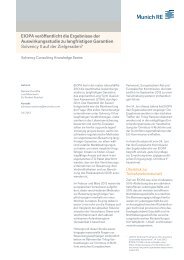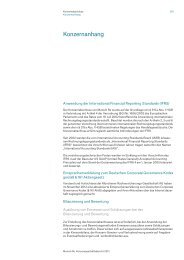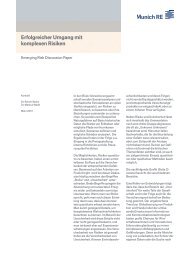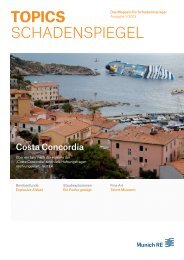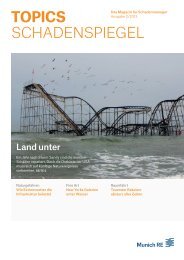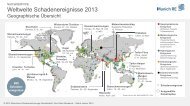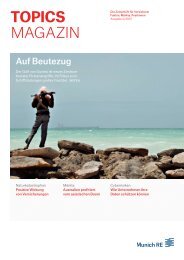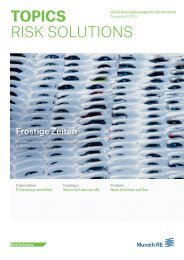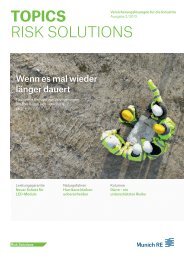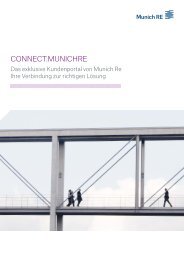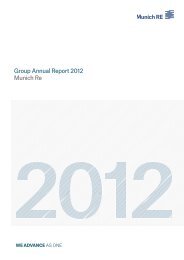Munich Re Group Annual Report 2006 (PDF, 1.8
Munich Re Group Annual Report 2006 (PDF, 1.8
Munich Re Group Annual Report 2006 (PDF, 1.8
Create successful ePaper yourself
Turn your PDF publications into a flip-book with our unique Google optimized e-Paper software.
<strong>Munich</strong> <strong>Re</strong> <strong>Group</strong> <strong>Annual</strong> <strong>Re</strong>port <strong>2006</strong> Management report_Risk report<br />
We minimise such risks through systematic application<br />
of specific risk management measures. It is our declared<br />
corporate aim, which we consistently pursue, to sensitise<br />
employees to possible risks and to establish an appropriate<br />
risk culture. This includes the willingness to learn from<br />
mistakes and to recognise and grasp these as opportunities<br />
for change and improvement.<br />
To prevent infringements of insider law, <strong>Munich</strong> <strong>Re</strong> has<br />
appointed a Compliance Officer, who ensures that inside<br />
information is handled in conformity with the law. In addition,<br />
a Disclosure Committee has been established to<br />
ensure that disclosure requirements regarding pricesensitive<br />
information are complied with.<br />
Compliance with antitrust regulations is a basic principle<br />
of <strong>Munich</strong> <strong>Re</strong>’s business policy. To prevent violations,<br />
staff are informed about antitrust regulations and<br />
are expected to comply with them. Line managers have<br />
been entrusted with delegated responsibilities to ensure<br />
compliance in this regard.<br />
We attach particular importance to precautionary<br />
measures that ensure continuity of our operations in an<br />
emergency or crisis situation. Business processes critical<br />
to value creation can be maintained or resumed as quickly<br />
as possible in such cases. <strong>Re</strong>sponsibility for establishing<br />
and monitoring this business continuity process in the<br />
<strong>Munich</strong> <strong>Re</strong> <strong>Group</strong> has been entrusted to a separate unit,<br />
which is guided by internationally recognised business<br />
continuity management standards (e.g. PAS 56).<br />
Risks in the area of information technology and project<br />
risks<br />
<strong>Munich</strong> <strong>Re</strong>’s global business and <strong>Group</strong>-wide risk management<br />
require an organisational and technical networking<br />
of our business units and systems. We are dependent on<br />
electronic communications technology, the complexity of<br />
which is continually increasing. The significance of the<br />
stored and transmitted information is growing as well. As<br />
a result, we are also increasingly exposed not only to IT<br />
security risks (such as breakdowns and outages, disruptions<br />
due to viruses, attacks by hackers and theft of data)<br />
but also to the risk of theft of information through the<br />
deception of staff (”social engineering”).<br />
These risks are identified and limited by decentralised<br />
security organisations that liaise closely. Their procedures<br />
are constantly being improved and adjusted to take into<br />
account the latest knowledge and state-of-the-art techniques.<br />
Our security regulations embrace not only the<br />
technical design of hardware and software systems but<br />
also functional security structures and organisational<br />
measures, including training staff in the proper handling<br />
of systems and data.<br />
Various major projects are currently being realised in<br />
our primary insurance and reinsurance business that,<br />
among other things, are integrating information architecture<br />
in the back-office area to an ever greater extent. Considerable<br />
project risks are related to size and complexity<br />
of such projects. Proceeding from project management,<br />
<strong>Munich</strong> <strong>Re</strong>’s project landscape will be made more transparent<br />
and the interfaces of individual projects enhanced<br />
by means of multi-project management designed to assess<br />
and control interdependencies better. In addition, the<br />
dependencies and priorities within the systems architecture<br />
are analysed and addressed by specially appointed<br />
committees.<br />
The conclusion of our internal IT project Gloria in <strong>2006</strong><br />
marked an important milestone in the unification – on the<br />
basis of an SAP standard product – of the entire reinsurance<br />
group’s IT and process landscape (more information<br />
on this may be found on page 109). This system, which has<br />
now gone live at <strong>Munich</strong> <strong>Re</strong> <strong>Munich</strong>, will successively be<br />
extended to the rest of the reinsurance companies in the<br />
<strong>Group</strong>, whilst additional systems that build on it are being<br />
designed and implemented.<br />
ERGO is also implementing important major projects,<br />
such as the ongoing convergence of its systems and<br />
processes in the health segment.<br />
Risks involving human resources<br />
The companies in the <strong>Munich</strong> <strong>Re</strong> <strong>Group</strong> have binding rules<br />
setting out minimum standards of corporate integrity for<br />
conduct within the companies themselves, their business<br />
transactions and other relationships with external parties.<br />
These standards, which are included in a detailed code of<br />
conduct, are tailored to the special features of each company<br />
and serve to prevent conflicts of interest for staff,<br />
thus ensuring that we use only fair and legal means of<br />
competition. The clear separation of management and<br />
control functions limits the risk of internal and external<br />
regulations being breached. We ensure that the German<br />
General Equal Treatment Act and similar anti-discrimin-<br />
135



